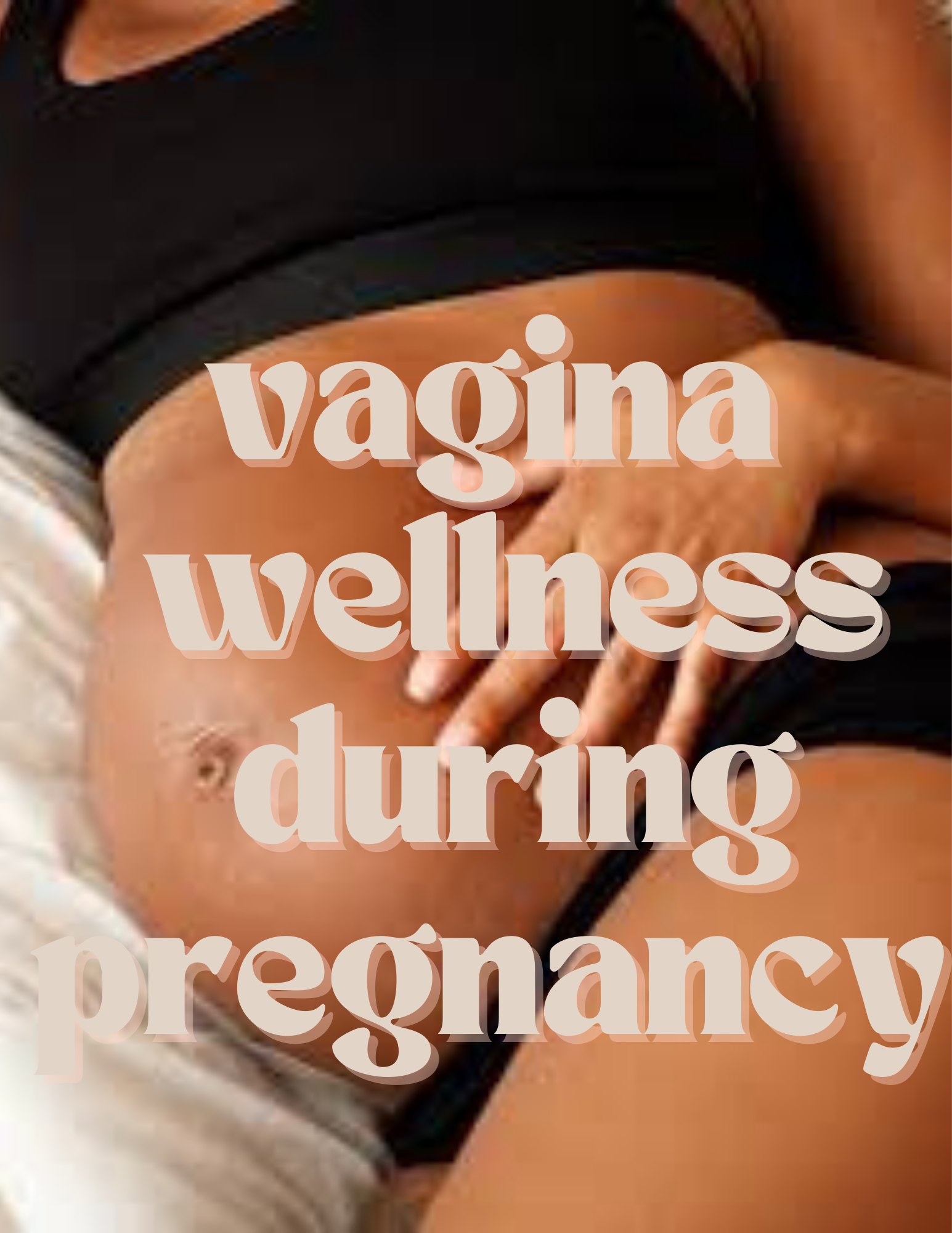Vaginal Wellness During Pregnancy: What to Expect and How to Care

The journey of pregnancy is a profound experience for women, encompassing various physical and hormonal changes. Among these transformations, the well-being of the vagina plays a crucial role in ensuring a healthy pregnancy. This article delves into the intricacies of vaginal health during pregnancy, shedding light on the changes, common concerns, and effective care practices that contribute to the overall well-being of expectant mothers.
Vaginal Changes During Pregnancy
Pregnancy is a transformative journey marked by a multitude of physical and hormonal changes, and the vagina, a crucial part of a woman's reproductive system, undergoes distinct transformations. Understanding these changes is vital for expectant mothers to navigate their pregnancy with knowledge and confidence. In this section, we explore the various shifts in the vaginal environment during pregnancy, shedding light on the intricate processes that contribute to the overall well-being of both mother and baby.
Hormonal Fluctuations and Vaginal Health
Estrogen Dominance:
Estrogen, a key hormone during pregnancy, surges to support the growth and development of the fetus. This increase in estrogen levels plays a pivotal role in shaping the vaginal environment. Elevated estrogen enhances blood flow to the pelvic region, resulting in changes that are essential for a healthy pregnancy.
Blood Flow and Sensitivity:
The heightened blood flow to the pelvic area engorges the blood vessels, leading to increased sensitivity in the vaginal and genital region. This heightened sensitivity is a natural adaptation to the physiological demands of pregnancy, contributing to a woman's overall awareness of her body.
Alterations in Vaginal Secretions:
Estrogen influences the composition of vaginal secretions. As estrogen levels rise, cervical mucus production increases, creating a mucus plug that seals the cervix. This protective barrier helps prevent infections, safeguarding the developing fetus from potential harm.
Increased Blood Flow and Secretions
Enhanced Blood Circulation:
One of the noticeable changes during pregnancy is the increased blood flow throughout the body, commonly referred to as hyperemia. This augmented blood circulation extends to the pelvic region, nourishing the developing fetus and supporting the changes in the vaginal environment.
Heightened Sensitivity:
The increased blood flow not only contributes to heightened sensitivity but also aids in the engorgement of the labia and clitoris. While these changes are a natural part of pregnancy, they can impact a woman's comfort and sexual experience.
Changes in Vaginal Secretions:
Apart from cervical mucus changes, vaginal secretions may also increase during pregnancy. These secretions serve as a protective mechanism, helping to prevent infections and maintain a healthy balance in the vaginal microbiome.
Changes in Vaginal pH Levels

Influence of Hormonal Shifts:
The hormonal fluctuations, particularly the increase in estrogen, influence the pH levels of the vagina. Normally acidic, the vagina creates an environment that inhibits the growth of harmful pathogens. Hormonal shifts during pregnancy may alter this pH balance, necessitating an understanding of the potential implications.
Maintaining pH Balance:
While hormonal changes can impact pH levels, the vagina generally maintains its acidic environment. This acidity is crucial for preventing infections and supporting the growth of beneficial bacteria, particularly lactobacilli, which dominate the healthy vaginal microbiome.
Adaptations for Pregnancy:
The changes in vaginal pH and secretions are adaptive mechanisms that prepare the body for childbirth. These alterations, orchestrated by hormonal fluctuations, contribute to creating a conducive environment for a healthy pregnancy and delivery.
The vaginal changes during pregnancy are intricate processes driven by hormonal fluctuations that support the well-being of both mother and baby. Understanding these transformations empowers expectant mothers to embrace the physical adaptations occurring in their bodies. The surge in estrogen, increased blood flow, heightened sensitivity, and alterations in vaginal secretions collectively contribute to a dynamic and resilient vaginal environment, essential for a successful pregnancy and the eventual arrival of a new life.
Common Concerns and Discomforts During Pregnancy
Pregnancy is a miraculous journey marked by profound physical and hormonal changes, and along with the joy of expectancy, women may encounter various common concerns and discomforts. Understanding these challenges is crucial for expectant mothers to navigate their pregnancy with confidence and seek appropriate care when needed. In this segment, we delve into the typical discomforts and concerns women may experience during pregnancy, providing insights into their causes and offering guidance on managing them effectively.
Hormonal Fluctuations and Nausea
Morning Sickness:
One of the most common discomforts during early pregnancy is morning sickness. Hormonal fluctuations, particularly elevated levels of human chorionic gonadotropin (hCG), contribute to nausea and vomiting. Managing morning sickness involves dietary adjustments, staying hydrated, and if needed, medical interventions.
Hormonal Impact on Digestion:
Progesterone, a hormone essential for maintaining pregnancy, can lead to the relaxation of the digestive tract muscles, causing indigestion and acid reflux. Eating smaller, more frequent meals and avoiding triggers can alleviate these symptoms.
Physical Changes and Discomforts
Back Pain:
As the body changes to accommodate the growing fetus, increased weight and shifts in the center of gravity may lead to back pain. Proper posture, gentle exercises, and prenatal yoga can help alleviate back discomfort.
Pelvic Pain and Pressure:
Hormonal changes and the expansion of the uterus can contribute to pelvic pain and pressure. Supportive garments, such as maternity belts, and exercises focusing on pelvic floor strength can provide relief.
Swelling and Edema:
Edema, or swelling, often occurs in the extremities due to increased blood volume and pressure on blood vessels. Elevation of the legs, regular movement, and adequate hydration can help manage swelling.
Emotional Well-being and Hormonal Influences
Mood Swings:
Hormonal fluctuations, combined with the emotional impact of impending motherhood, can lead to mood swings. Establishing a support system, practicing relaxation techniques, and communicating openly can assist in managing emotional well-being.
Sleep Disruptions:
Physical discomfort, hormonal changes, and increased frequency of urination can disrupt sleep during pregnancy. Creating a comfortable sleep environment, establishing a routine, and practicing relaxation techniques contribute to better sleep.
Gastrointestinal Changes and Concerns
Constipation:
Progesterone-induced muscle relaxation affects the digestive tract, leading to constipation. Adequate fiber intake, hydration, and gentle exercise support regular bowel movements.
Hemorrhoids:
Increased pressure on blood vessels in the pelvic area can result in hemorrhoids. Warm baths, topical treatments, and maintaining a high-fiber diet aid in alleviating hemorrhoidal discomfort.
Skin and Vaginal Changes
Stretch Marks:
The skin stretching to accommodate the growing belly may result in stretch marks. Regular moisturizing and staying hydrated can help minimize their appearance.
Vaginal Discharge and Irritation:
Hormonal changes can influence vaginal discharge, and increased blood flow to the pelvic region may cause heightened sensitivity. Wearing breathable underwear and maintaining good hygiene support vaginal health.
Hygiene Practices for Vaginal Wellness

Maintaining proper hygiene is fundamental for promoting optimal vaginal health. The vagina is a self-cleaning organ with a delicate balance of microorganisms, and adopting good hygiene practices is essential to support this natural equilibrium. In this segment, we explore key hygiene practices that contribute to vaginal wellness and help prevent infections, irritation, and imbalances.
Daily Cleansing Routine
1. Gentle Cleansing:
- Use a mild, fragrance-free soap specifically designed for the genital area.
- Avoid harsh cleansers that may disrupt the natural pH balance.
2. External Cleaning:
- Gently clean the external genital area, including the labia, using your hand.
- Avoid using loofahs or harsh scrubbing, as they can cause irritation.
3. Front-to-Back Wiping:
- Always wipe from front to back after using the toilet to prevent the spread of bacteria from the anal region to the vagina.
Menstrual Hygiene
4. Regular Changing:
- Change sanitary pads, tampons, or menstrual cups regularly, especially during heavy flow days.
- Prolonged use of the same product can increase the risk of bacterial overgrowth.
5. Choose Breathable Products:
- Opt for menstrual products made from breathable materials to reduce moisture and minimize the risk of irritation.
Clothing Considerations
6. Cotton Underwear:
- Wear breathable, cotton underwear to allow air circulation and minimize moisture.
- Avoid tight, synthetic underwear that can trap heat and moisture.
7. Loose-Fitting Clothing:
- Choose loose-fitting, breathable clothing, especially in the genital area, to prevent friction and irritation.
Intimate Care Products
8. pH-Balanced Cleansers:
- Use pH-balanced cleansers specifically formulated for intimate hygiene.
- Harsh or alkaline soaps can disturb the acidic environment of the vagina.
9. Avoid Douching:
- Douching is not recommended, as it can disrupt the natural balance of the vaginal microbiome and increase the risk of infections.
Sexual Hygiene
10. Safe Sex Practices:
- Practice safe sex by using condoms to prevent sexually transmitted infections (STIs).
- Communicate openly with sexual partners about STI prevention and get regular screenings.
Adopting these hygiene practices fosters a supportive environment for the vagina's natural processes. It's crucial to recognize that individual needs may vary, and consulting with healthcare providers for personalized advice ensures a holistic and proactive approach to vaginal wellness. Prioritizing hygiene and self-care contributes to a confident and empowered journey toward optimal vaginal health.
Sexual Health and Intimacy
Safe Practices
- Protection: Always use protection to ensure safe and consensual intimate experiences.
- Check-ups: Regular sexual health check-ups are important for both partners.
Communication
- Talk Openly: Communicate openly with your partner about desires, concerns, and boundaries.
- Consent Matters: Always ensure clear and enthusiastic consent during intimate moments.
Emotional Connection
- Emotional Well-being: Emotional well-being affects sexual health, so spend quality time building a strong connection.
- Quality Time: Dedicate time to deepen your emotional bond for a more satisfying intimate life.
After Childbirth and Menopause
- Postpartum Changes: Understand and navigate changes after childbirth with support and guidance.
- Menopausal Care: Approach menopausal changes openly and seek guidance for maintaining intimacy.
Lifestyle and Dietary Considerations
Impact of Diet on Vaginal Health
- Balanced Diet: Eating a balanced diet with a mix of fruits, veggies, whole grains, and proteins provides essential nutrients, keeping the reproductive system in good shape.
- Probiotics: Include probiotic-rich foods like yogurt for a healthy balance of bacteria in the vagina, preventing potential issues.
- Antioxidants: Berries and leafy greens, packed with antioxidants, help fight inflammation and support the body's natural defenses.
- Vitamins and Minerals: Make sure to get enough vitamin D, zinc, and other vital nutrients that play roles in maintaining vaginal health.
- Stay Hydrated: Drinking enough water is crucial. It helps prevent vaginal dryness, ensuring comfort and proper lubrication.
- Watch Sugar Intake: Limit sugary foods as they can contribute to yeast overgrowth. Managing sugar helps maintain a healthy vaginal balance.
- Caffeine and Alcohol: Moderation is key for caffeine and alcohol. Too much can affect hormonal levels, so balance is important.
- Healthy Choices: Opt for whole, unprocessed foods and limit unhealthy fats. These choices support overall well-being, including reproductive health.
In simple terms, a balanced and nutritious diet supports a healthy vagina, and making smart food choices contributes to overall well-being.
Conclusion
In the magnificent journey of pregnancy, a woman experiences a cascade of changes, both profound and beautiful. Understanding and caring for vaginal wellness during this time is crucial for the overall well-being of both the expectant mother and her growing baby. As we've explored, pregnancy brings about shifts in hormones, increased blood flow, and unique hygiene considerations. MyFlowerBox emerges as a trusted companion, offering personalized solutions for the evolving needs of expectant mothers.
As we welcome the newest addition to the family, let us also celebrate the strength and resilience of the expectant mother. MyFlowerBox is dedicated to enhancing the pregnancy experience, promoting overall wellness, and being a partner in the journey towards motherhood. With a focus on personalized care, gentle formulations, and a commitment to supporting the diverse experiences of women, MyFlowerBox invites expectant mothers to embrace this beautiful phase with grace and confidence. Here's to the blooming journey of motherhood, where MyFlowerBox stands as a symbol of care, comfort, and celebration.
Blossom into Motherhood: Nurturing Vaginal Wellness During Pregnancy with MyFlowerBox!
Embrace the journey of motherhood with MyFlowerBox! Our curated solutions cater to the unique needs of vaginal wellness during pregnancy. Elevate your experience by nurturing your well-being with MyFlowerBox – your companion for a healthier and more vibrant pregnancy. Explore the care you deserve, and blossom into motherhood with confidence and comfort. Your wellness, your journey – entrust it to MyFlowerBox!
0 comments





